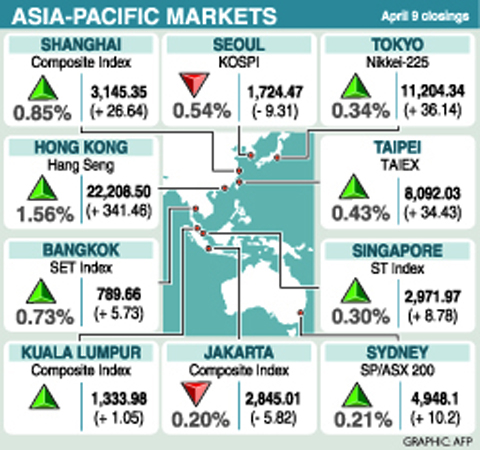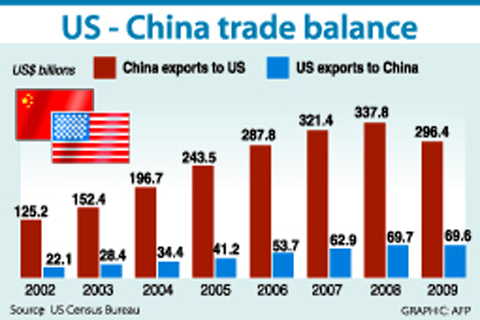Asian stocks rose for a second week, as US economic reports raised confidence in the strength of global recovery, and as investors bet the Federal Reserve will leave the benchmark US interest rate at a record low.
Caltex Australia Ltd surged 8.1 percent in Sydney after Macquarie Group Ltd boosted the oil-refining company’s share forecast. Taiwanese handset maker HTC Corp (宏達電) climbed 3.3 percent in Taipei this week after posting an unexpected profit increase. Canon Inc, the world’s largest camera maker, fell 3.4 percent in Tokyo after Goldman Sachs Group Inc cut its rating, and as the yen strengthened against the US dollar during the end of the week.
“Recent US data has been unequivocally positive, which has been boosting investor risk appetite globally,” said Prasad Patkar, who helps oversee about US$1.7 billion at Platypus Asset Management in Sydney.

The MSCI Asia-Pacific Index advanced 1.19 percent this week as economic reports from the US showed signs of global recovery.
Taiwan’s TAIEX index climbed 0.8 percent in the past week to 8,092.03.
“The market has rallied as the recovery momentum is building up,” said Khiem Do, Hong Kong-based head of multi-asset strategy at Baring Asset Management (Asia) Ltd, which oversees US$11 billion. “We need to see better-than-expected economic data and earnings to sustain this rally.”

Hong Kong’s Hang Seng Index advanced 3.1 percent this week, its best weekly return in six, while South Korea’s KOSPI index rose 0.1 percent.
Australia’s S&P/ASX 200 Index climbed 0.8 percent this week as commodity prices gained on indications the US economic growth will accelerate.
Japan’s Nikkei 225 Stock Average slid 0.7 percent this week as the yen reversed some of its recent losses, raising concerns about the earnings outlook for companies dependent on overseas demand. China’s Shanghai Composite Index declined 0.4 percent.
Markets in Australia, New Zealand, China and Taiwan were closed on Monday for holidays. Hong Kong’s markets were closed on Monday and Tuesday.
Caltex jumped 8.1 percent to A$12.22 after Macquarie analysts raised the company’s share-price forecast by 12 percent, citing a “more optimistic outlook for margins.”
Japanese exporters declined as the yen strengthened during the week, raising concern it will reduce companies’ revenue from overseas sales when converted into the local currency. Canon retreated 3.4 percent to ¥4,250 after Goldman Sachs cut its rating to “neutral” from “buy.” Panasonic Corp, the world’s biggest maker of plasma televisions, declined 1.1 percent to ¥1,423.
Komatsu Ltd, the world’s second-largest maker of construction equipment, slumped 3.7 percent to ¥1,910 after the Cabinet Office said on Thursday that machine orders unexpectedly fell 5.4 percent in February from January.
Bank of Japan Governor Masaaki Shirakawa and his board left the benchmark interest rate at 0.1 percent by a unanimous vote, the central bank said in a statement in Tokyo on Wednesday.

CHIP WAR: The new restrictions are expected to cut off China’s access to Taiwan’s technologies, materials and equipment essential to building AI semiconductors Taiwan has blacklisted Huawei Technologies Co (華為) and Semiconductor Manufacturing International Corp (SMIC, 中芯), dealing another major blow to the two companies spearheading China’s efforts to develop cutting-edge artificial intelligence (AI) chip technologies. The Ministry of Economic Affairs’ International Trade Administration has included Huawei, SMIC and several of their subsidiaries in an update of its so-called strategic high-tech commodities entity list, the latest version on its Web site showed on Saturday. It did not publicly announce the change. Other entities on the list include organizations such as the Taliban and al-Qaeda, as well as companies in China, Iran and elsewhere. Local companies need

CRITICISM: It is generally accepted that the Straits Forum is a CCP ‘united front’ platform, and anyone attending should maintain Taiwan’s dignity, the council said The Mainland Affairs Council (MAC) yesterday said it deeply regrets that former president Ma Ying-jeou (馬英九) echoed the Chinese Communist Party’s (CCP) “one China” principle and “united front” tactics by telling the Straits Forum that Taiwanese yearn for both sides of the Taiwan Strait to move toward “peace” and “integration.” The 17th annual Straits Forum yesterday opened in Xiamen, China, and while the Chinese Nationalist Party’s (KMT) local government heads were absent for the first time in 17 years, Ma attended the forum as “former KMT chairperson” and met with Chinese People’s Political Consultative Conference Chairman Wang Huning (王滬寧). Wang

CROSS-STRAIT: The MAC said it barred the Chinese officials from attending an event, because they failed to provide guarantees that Taiwan would be treated with respect The Mainland Affairs Council (MAC) on Friday night defended its decision to bar Chinese officials and tourism representatives from attending a tourism event in Taipei next month, citing the unsafe conditions for Taiwanese in China. The Taipei International Summer Travel Expo, organized by the Taiwan Tourism Exchange Association, is to run from July 18 to 21. China’s Taiwan Affairs Office spokeswoman Zhu Fenglian (朱鳳蓮) on Friday said that representatives from China’s travel industry were excluded from the expo. The Democratic Progressive Party government is obstructing cross-strait tourism exchange in a vain attempt to ignore the mainstream support for peaceful development

DEFENSE: The US would assist Taiwan in developing a new command and control system, and it would be based on the US-made Link-22, a senior official said The Ministry of National Defense is to propose a special budget to replace the military’s currently fielded command and control system, bolster defensive resilience and acquire more attack drones, a senior defense official said yesterday. The budget would be presented to the legislature in August, the source said on condition of anonymity. Taiwan’s decade-old Syun An (迅安, “Swift Security”) command and control system is a derivative of Lockheed Martin’s Link-16 developed under Washington’s auspices, they said. The Syun An system is difficult to operate, increasingly obsolete and has unresolved problems related to integrating disparate tactical data across the three branches of the military,